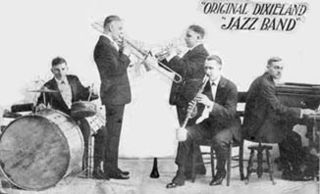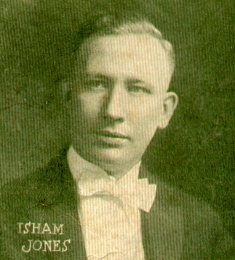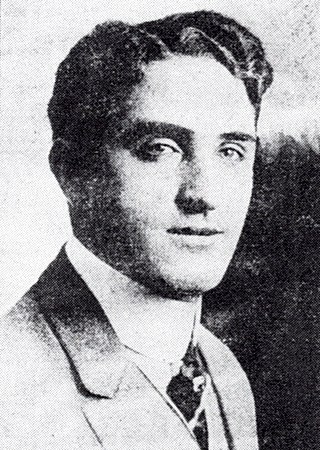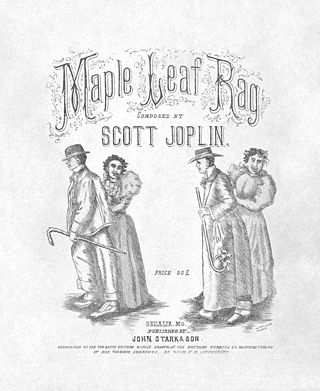Related Research Articles
Ragtime, also spelled rag-time or rag time, is a musical style that had its peak from the 1890s to 1910s. Its cardinal trait is its syncopated or "ragged" rhythm. Ragtime was popularized during the early 20th century by composers such as Scott Joplin, James Scott and Joseph Lamb. Ragtime pieces are typically composed for and performed on piano, though the genre has been adapted for a variety of instruments and styles.

The Original Dixieland Jass Band (ODJB) was a Dixieland jazz band that made the first jazz recordings in early 1917. Their "Livery Stable Blues" became the first jazz record ever issued. The group composed and recorded many jazz standards, the most famous being "Tiger Rag". In late 1917, the spelling of the band's name was changed to Original Dixieland Jazz Band.

This is a list of notable events in music that took place in the year 1917.

Joseph Russel Robinson was an American ragtime, dixieland, and blues pianist and composer. He was a member of the Original Dixieland Jass Band.

Isham Edgar Jones was an American bandleader, saxophonist, bassist and songwriter.

Charles Luckyth Roberts, better known as Luckey Roberts, was an American composer and stride pianist who worked in the jazz, ragtime, and blues styles. Roberts performed as musician, band/orchestra conductor, and dancer. He taught music and dance. He also owned a restaurant and bar in New York City and in Washington, D.C. Luckey Roberts noted compositions include "Junk Man Rag", "Moonlight Cocktail", "Pork and Beans" (1913), and "Railroad Blues".

Louis Wolfe Gilbert was a Russian-born American songwriter of Tin Pan Alley. He is best remembered as the lyricist for "Ramona" (1928), the first movie theme song ever written.

The "Maple Leaf Rag" is an early ragtime musical composition for piano composed by Scott Joplin. It was one of Joplin's early works, becoming the model for ragtime compositions by subsequent composers. It is one of the most famous of all ragtime pieces. Its success led to Joplin being dubbed the "King of Ragtime" by his contemporaries. The piece gave Joplin a steady if unspectacular income for the rest of his life.

Edward Elzear "Zez" Confrey was an American composer and performer of novelty piano and jazz music. His most noted works were "Kitten on the Keys" and "Dizzy Fingers." Studying at the Chicago Musical College and becoming enthralled by French impressionists played a critical role in how he composed and performed music.

Charles Theodore "Charley" Straight was an American pianist, bandleader and composer.

Roy Fredrick Bargy was an American composer and pianist.

George Linus Cobb was an American composer. He composed over 200 pieces of music, including ragtime, marches, and waltzes. He also wrote columns for music trade publications.

"Twelfth Street Rag" is a ragtime musical composition published by Euday L. Bowman in 1914.

The "Black and White Rag" is a 1908 ragtime composition by George Botsford.

"Avalon" is a 1920 popular song written by Al Jolson, Buddy DeSylva and Vincent Rose referencing Avalon, California. It was introduced by Jolson and interpolated in the musicals Sinbad and Bombo. Jolson's recording rose to number two on the charts in 1921. The song was possibly written by Rose, but Jolson's popularity as a performer allowed him to claim composer co-credit. Originally, only Rose and Jolson were credited, and DeSylva's name was added later.

Nathan "Ned" Miller was a British-born American songwriter, composer, music publisher, and actor who wrote the hit songs, "Why Should I Cry Over You", in 1922, "Sunday" in 1926, and "Little Joe" in 1931. His music has been recorded by Frank Sinatra, Nat King Cole, Louis Armstrong, Al Jolson, Carmen McRae, Stan Getz, Peggy Lee, the Ink Spots, Johnny Mercer, Benny Goodman, Andy Williams, and many others. His music has also been featured in weekly TV programs and films. In 1982, Ned Miller was inducted into the American Society of Composers, Authors and Publishers (ASCAP) Golden Circle after having been a member for fifty years.
Wallie Herzer(néWalter Henry Herzer; 15 April 1885 San Francisco – 15 October 1961 Redwood City, California) was an American composer of popular music, music publisher, and pianist. Herzer flourished in music prior to and during World War I.

Lyons and Yosco were an American comedy duo, consisting of Italian American musicians George Lyons and Bob Yosco. They were defined by the Ottawa Evening Journal "the finest pair of Italian street musicians playing in the Vaudeville ranks." They toured the United States from 1909 into 1923, doing a musical and comedy act. The News Journal described their performance, saying they were "the best vocalists and instrumentalists of the street variety on the stage, proved intensely interesting, while their droll comedy kept the audience laughing much of the time."
References
- 1 2 3 4 5 6 7 8 9 10 11 12 "Frank Henri Klickmann". Ragpiano. Retrieved 14 January 2016.
- ↑ "F. Henri Klickmann, Composer and Arranger, Dead at 81". The New York Times. 27 June 1966. Retrieved 14 January 2016.
- ↑ Jasen, David A. (1988). Tin Pan Alley: the Composers, the Songs, the Performers and their Times. Donald I. Fine, Inc. p. 92. ISBN 1556110995.
- ↑ Jasen, David A. (1988). Tin Pan Alley: The Composers, the Songs, the Performers and their Times. United States of America: Donald I. Fine, Inc. p. 92. ISBN 1-55611-099-5.
- ↑ Chadbourne, Chad. "F. Henri Klickmann". All Music. Retrieved 14 January 2016.
- ↑ "F. Henri Klickmann (composer)". Discography of American Historical Recordings. Retrieved 14 January 2016.